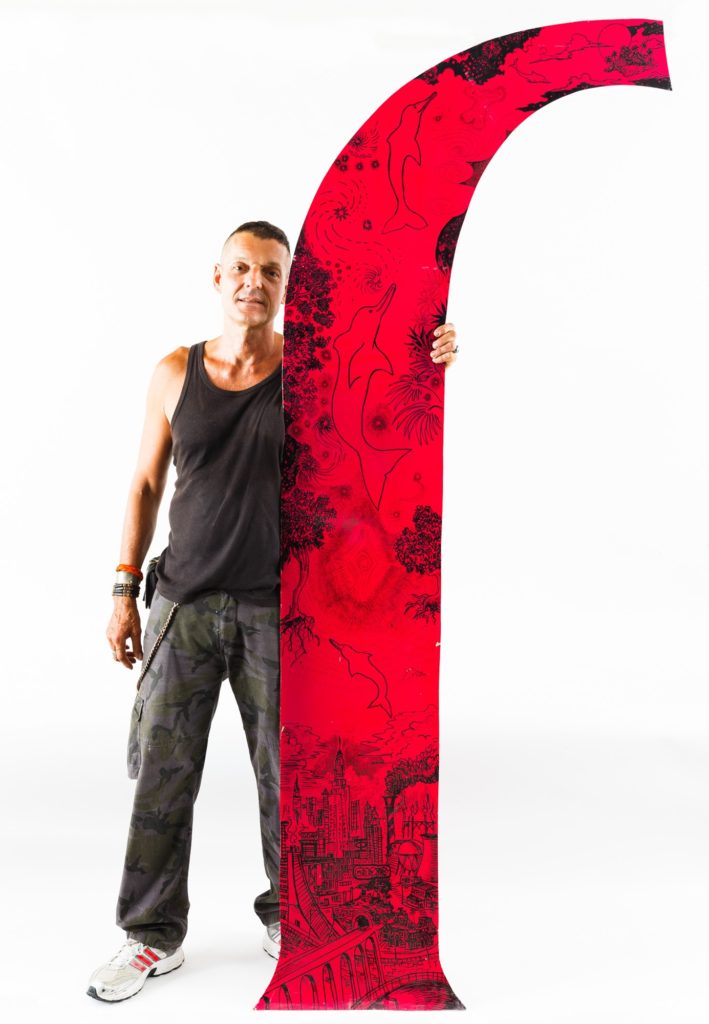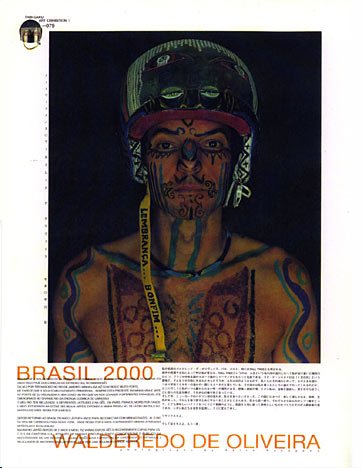Amazon Dreamtime
Eco-Art by Walderedo De Oliveira
The Artist

Walderedo De Oliveira
Born in Rio de Janeiro, Brazil. Lived and worked in Paris, Morocco, NYC, São Paulo, Arizona, Bali. Presently based in Kyoto, Japan and throughout the world.
For Brazilian born artist Walderedo De Oliveira, the Amazonian rain forest is more than a theme for his striking, sensual and visionary canvases, the fate of that vast tract of land and of its native cultures, now being destroyed at an unprecedented rate, is both an inspiration and a spiritual obsession. If this environment and its Indian inhabitants are destroyed, Walderedo is convinced, a part of us will die as well.
Walderedo’s deep concern for the rain forests is not a new one. As a teenager in Brazil, the artist had already grasped the tragedy that lay ahead if exploitation of the Amazon continued.
The artist believes that an unfortunate blindness to the fate of the Indians’ environment is common in Brazil; most Brazilians think that the Amazon will never vanish.
Despite this attitude, or because of it, more than 10,000 thousand square miles of Amazon Rainforest are destroyed each year by logging and cattle farming. In the devastation, more than a hundred species of plants, animal and insects are lost each day. The indigenous people and cultures of the forest are being displaced. In few hundred years ago, 9 million indigenous people inhabited the Amazon. Today, fewer than 200,000 remain. As the Amazon dies, we lose cultures, biodiversity, and beauty of untold value.
Walderedo hopes that his work, inspired by the Amazon, can help inspire the citizens of the world to find balance in their way of life, to work to guarantee the survival of our healthy natural environment for generations to come.
I hope that in viewing my art, modern men may see and better understand the infinite possibilities of self-sustenance offered to us by the cultures of forest people.
Deep within the trees, these people have lived, generation after generation, in an intimate and harmonious relationship with our Mother Nature.
Having developed a very complex and sophisticated culture based on their natural surroundings and conscious of their role as equal players in the constantly changing cosmos, they interact and live peacefully with all the other species.
The exhaustion of the world’s natural resources taking place today represents the exhaustion of our civilization itself. A renovation of values and ethics, an ‘EcoRevolution’ is needed and expected to come by native cultures around the world, as well as large portions of city dwellers.
Perhaps a closer look at the traditional ways of native cultures can bring illumination to the obscurity of our days to come.
— Walderedo De Oliveira, New York, 1995 (revised in Kyoto 2006)
Walderedo De Oliveira CV
Born in Rio de Janeiro, Brazil. Lived and worked in Paris, Morocco, NYC, São Paulo, Arizona, Bali. Presently based in Kyoto, Japan and throughout the world.
- Contact: Walderedo de Oliveira
- Selected works on Google Photos
EDUCATION
1976–1982
- École Nationale Supérieure des Beaux-Arts, Masters Degree in Painting. Paris, France
1970–1971
- Centro de Pesquisa de Arte Ivan Serpa. Rio de Janeiro, Brazil
EXHIBITIONS
2014
- “4 Eyes, 2 Hands, 1 Vision,” main artist and organizer of a two-artist show, Kyoto Gallery. Kyoto, Japan
Solo Shows
2009
- “Gaia Speaks,” Gallery JARFO (Japanese Art Foundation). Kyoto, Japan
- “Eros & Tanatus,” B Gallery, Beams. Shinjuku, Tokyo, Japan
- “Gaia Speaks,” Tokyo Salon. Las Chicas, Tokyo, Japan
2006
- “Bridges to the Amazon,” Wacoal Spiral Garden. Aoyama, Tokyo, Japan
- “Peace With Nature,” B Gallery, Beams. Tokyo, Japan
2004
- “Ecotopia,” B Gallery, Beams. Tokyo, Japan
2003
- Art Point Gallery. Tokyo, Japan
2002
- Hayama Spring Art Festival. Stage Gallery. Hayama-machi, Japan Gallery Cafe David. Kyoto, Japan
2001
- “Summer Impressions.” Iteza Gallery. Kyoto, Japan
2000
- Gallery Kihzo. Scottsdale, Arizona, USA
- Gallery Café David. Kyoto, Japan
- IDEE Gallery. Tokyo, Japan
- “Give Life a Second Chance – Recycle It!” Japan Art Forum. Kyoto, Japan
- “At Your Own Risk,” Gusto House. Kobe, Japan
- PIAS Gallery. Osaka, Japan
1999
- “Healing of The 4 Directions.” Sony Tower, Osaka, Japan
- “The Healing of The 4 Corners.” Dohjidai Gallery, Kyoto, Japan
1998
- “Different People, One Shelter.” Hacknet and Garbe Art Space, Osaka, Japan
- “Animal Talk.” JM Gallery, Tokyo, Japan
1997
- White Art Gallery. Tokyo, Japan
- Trax Gallery. Yamanashi-Ken, Japan
1996
- Galeria Aboporu. Salvador, Bahia, Brazil
1995
- London Gallery. New York, USA
1994
- Govinda Gallery. Washington D.C., USA
- “Feather and Fantasy, Art & Earth,” United Nations, New York, USA
1992
- “Only One World.” Nicolas Roerich Museum, New York, USA
1991
- Sareido Gallery. New York, USA
- Ergane Gallery. New York, USA
1989
- Amazon Gallery. Venice, Los Angeles, USA
- Music Academy of The West. Montecitos, Santa Barbara, USA
1986
- Galeria Bonfgliolli. São Paulo, Brazil
1984
- Galeria de Arte Banerj. Rio de Janeiro
- Museo de Arte de Moderna da Bahia. Salvador, Bahia
1983
- Museo de Arte de São Paulo (MASP). São Paulo, Brazil
1982
- Gallery Un Moment en Plus. Paris, France
1981
- Galeria do Bonfim. Amsterdan, Holland
1978
- Galerie du Hotel Mamounia. Marrakesh, Morocco
1976
- Galerie La Taniere. Paris, France
1974
- Galeria Montmartre George. Rio de Janeiro, Brazil
Group Shows
1999
- Latin American and Caribbean Art Exhibition, Nogimachi Culture Center. Tochigi-Ken, Japan
1997
- “Echoes From The Amazon,” Amrta. Tokyo, Japan
1997
- World Art Festival. Kyoto, Japan
1994
- Walter Wickiser Gallery. New York, USA
1993
- H.B. Starr Gallery. Palm Beach, Florida, USA
- “Imaritima,” Cast Iron Gallery. New York, USA
1991
- “A la recherche de L`Ecole de Paris.” Daimaru, Osaka, Japan
- Environmental Art Exhibition, Amlux Toyota Museum. Tokyo, Japan
1990
- “No Boundaries On The Planet of Tupis II,” Moscow
- Global Forum on The Environment and Development for Survival. Moscow, U.S.S.R.
- Latin American Exhibition, Ergane Gallery. New York, USA
- “New York Artists In Barcelona,” Cartoon Gallery. Barcelona, Spain
1989
- “No Bounderies On The Planet of Tupis.” London Echology Center, London England
1985
- “Projeto Viva o Rio,” Museo de arte Moderna do Rio de Janeiro. Rio de Janeiro, Brazil
1982
- Salon de La Figuration Critique. Paris, France
- Salon D`Art Latino-Américain, Grand Palais. Paris, France
1981
- Salon de La Figuration Critique. Paris, France
- Salon de Beaux-Arts, Grand Palais. Paris, France
1980
- Galerie L’Oeil de Boeuf. Paris, France
1978
- Galerie L’Oeil de Boeuf. Paris, France
1976
- École Nationale Supérieure des Beaux-Arts de Paris, France
As Curator
International group exhibitions
2014
- “Bridges to Amazon III,” Kamakura Drawing Gallery and Jack & Mame no Ki Gallery. Kamakura, Japan
- “Bridges to Amazon,” PRINZ Gallery, Kyoto and Ashita no Hako Gallery, Osaka, Japan
2013
- “Small Art for Big Nature,” Halo Gallery. Kyoto, Japan
2012
- “Bridges to Amazon II,” ZEST. Kyoto, Japan
- “Bridges to Amazon,” Kyoto International Cultural Center. Kyoto, Japan
EVENTS
2017
- Live painting performance, Yuan Ru Gallery. Taipei, Taiwan
2009
- Workshop, Osaka Fine Arts University. Osaka, Japan
2004–2009
- Earth Day celebration multi-media art event, Shin-Puh-Kan center. Kyoto, Japan
2002
- Live Painting Performance, Blue Moon, Hayama, Japan
- Live Painting Performance, Secco Bar. Tokyo, Japan
- Live Painting Performance, Stage Gallery, Hayama
- Spring Art festival. Hayama, Japan
- Live Painting Performance, Cafe David Gallery. Kyoto, Japan
2001
- Live Painting Performance, Blue Moon. Hayama, Japan
- Live Painting Performance, Kyoto Earth Day, Club Metro. Kyoto, Japan
- Body Painting, singer Minako, JVC-Victor, photo shooting promotion for SWITCH Magazine. Tokyo, Japan
2000
- Live Painting for the opening party of Benetton Megastore Omotesando. Tokyo, Japan
- Live Painting Performance, Kyorukan. Kyoto, Japan
- Live Painting Performance, Cafe David Gallery. Kyoto, Japan
- Live Painting Performance, Fuji Rock Music Festival. Japan
- Live Painting Performance, IDEE. Tokyo, Japan
- Live Performance, World Environment Day, United Nations University. Aoyama, Tokyo, Japan
- Slideshow/ Live Painting Performance, Cap House. Kobe, Japan
- Live Painting Performance, Kyoto Earth Day. Kyoto, Japan
1999
- Slideshow / Live Painting Performance, Cafe Independents. Kyoto, Japan
- Solo Exhibition and Live Performance Painting “Healing of the 4 Directions,” SONY Tower. Osaka, Japan
- Solo Show at DENTSU-Kansai. Osaka, Japan
- Solo Exhibition/ Music performance, Kanto Grande. Osaka, Japan
1998
- US-Earth Access Committee: Robert Kennedy Jr. Environmental Conference, Akasaka Prince Hotel. Tokyo, Japan
1997
- Lecture and Workshop: “Ecology, Recycle and Creativity,” Tokyo University. Tokyo, Japan
1995
- New York Earth Day 25th Anniversary: Gigantic Slide Projection on the Empire State Building. New York, USA
- Solo Show at Amazon Week V, United Nations. New York, USA
COMMERCIAL ART
CD Jacket Illustration
2009
- Dragon Ash: Freedom, JVC Victor Music, Japan
2001
- Choro Club: Marítima, Sony Music Japan
2000
- Jephete Guillaume: Voyages of Dreams. AVEX, Japan
- UA: Turbo, JVC Victor Music, Japan
- UA: Private Surfer single. JVC Victor Music, Japan
- Ska Compilation 6 CD series. Justa Records, AVEX, Japan
1997
- Jephete Guillaume: Voyages of Dreams Spiritual Music, US, UK, France
1978
- Jimi Hendrix: Compilation, Phermata, Brazil
EMPLOYMENT
Art teacher at Temple University Tokyo, Japan, 2006–2008
